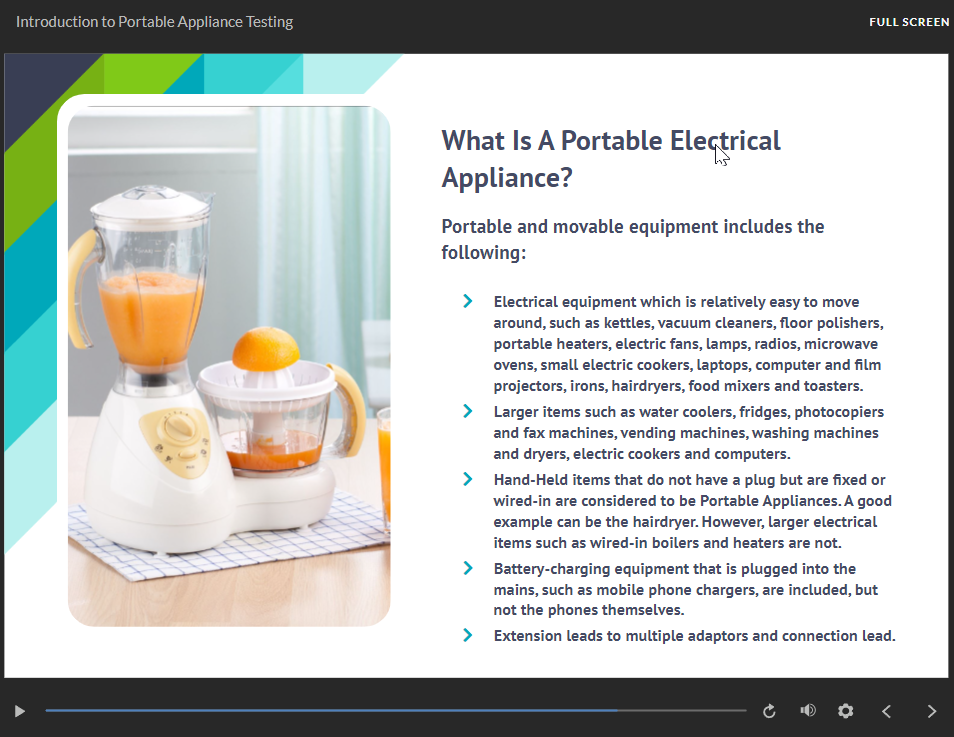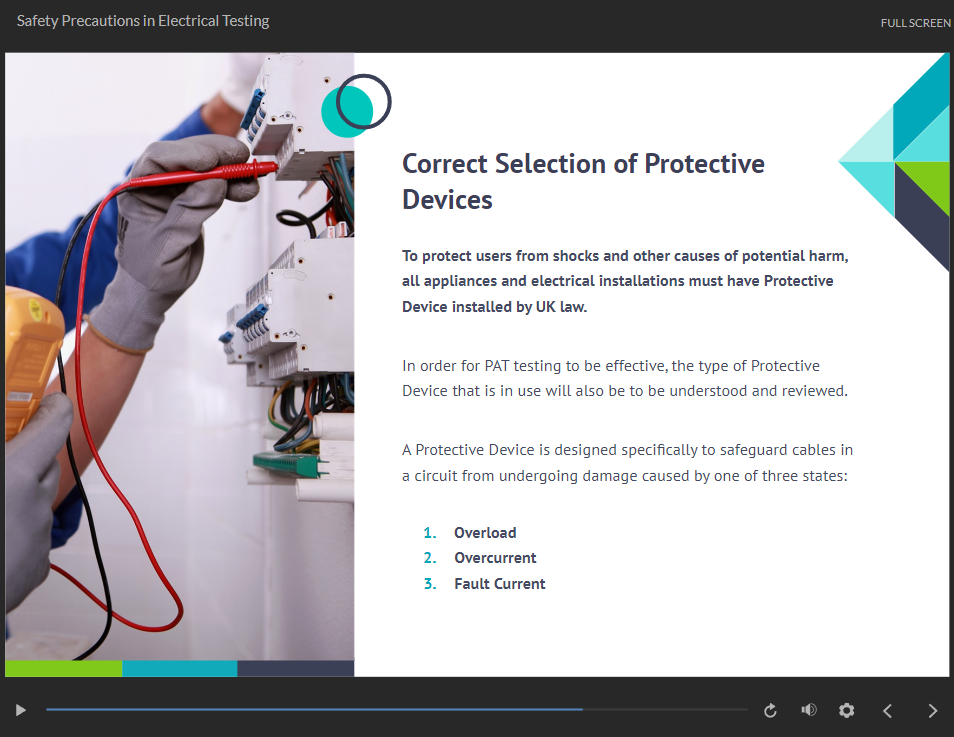GET THIS COURSE AND 1500+ OTHERS FOR ONLY £49 PER YEAR. FIND OUT MORE
This Online PAT Testing Course / Portable Appliance Testing Training Course is designed to help you familiarise yourself with testing technical appliances, while training you to know how to assess and minimise risks, carry out inspections and understand the safety procedures that need to be in place when using portable appliances at work.
Portable appliance testing equipment is found in the majority of workplaces across the UK. To prevent workplace hazards such as electrical fires and electrical shocks, it’s important that managers and responsible employees are aware of how to perform maintenance check-ups. Learn all about PAT Testing in the UK with this PAT testing course online with a free certificate.
This course is suitable for employers and employees in low-risk workplaces, such as shops or offices, who are responsible for ensuring workplace health and safety. No previous training is required for this course, which can be accessed online from any device.
- Accredited by CPD
- Guidance to comply with The Electricity at Work Regulations 1989
- Developed by qualified health and safety professionals
- Instant FREE e-certificate and hard copy dispatch by next working day
- Fully online, interactive course with audio voiceover
- Self paced learning and laptop, tablet, smartphone friendly
- 24/7 Learning Assistance
- Discounts on bulk purchases
£24,600 Average Salary, Up to £32,000/yr for this skill according to top UK career sites.
Sneak Peek of the Online PAT Testing Course
PAT Testing Course Online Demo
Who should take this Online PAT Testing Course
Under the 1989 Electricity Rules, any electrical device that can cause damage needs to be safely maintained. Portable Appliance Testing is a reliable way to ensure this. PAT Testers need to know the types of damage they might find at work and be trained on how to test correctly. They must also know their tools well to ensure consistent results and avoid damaging items.
This technical course is primarily for individuals who are responsible for shared electrical appliances. This would include people like;
- Electricians
- Property Owners
- Maintenance staff
- Facility management staff
- Shop Owners
Why take this Online PAT Testing Course in the UK?
The primary motive behind carrying out a PAT test lies in ensuring safety. It is crucial to maintain the safety benchmarks for electrical devices within your establishments. Given the rising presence of counterfeit electrical goods in today’s market, verifying the authenticity and safety of your electrical items is essential. After acquiring any new electrical item, it’s recommended to undertake a PAT test and subsequently at regular intervals to monitor any potential wear and assess adherence to safety protocols.
Signing up for this online course enables you to learn at your convenience and at your own pace. Regular updates, reflecting the latest industry standards, help you to stay up to date with the latest electrical safety practices. The demand for portable appliance testing skills increases job opportunities in this field. In addition, the certification broadens one’s understanding of electrical safety. This is why learning PAT testing is a valuable skill, beneficial both personally and professionally.
Learning Outcomes
By the end of the PAT testing online course, learners will be able to readily demonstrate that they can:
- Demonstrate expertise in performing PAT principles
- Understand the relevant statutory provisions for PAT
- Carry out different types of PAT examination.
- Combine inspection and testing together.
- Learn how to perform initial visual examination
- Understand the process of attempting risk assessments
- Learn key strategies of reporting and record-keeping
- Master key strategies and techniques of electrical installation testing
- Learn about PAT testing regulations in the UK
- Carry out different types of PAT examination.
- Combine inspection and testing together.
- Demonstrate good knowledge of health and safety with electricity.
- Prevent faulty equipment from harming employees.
- Show how they display and record the actions they have performed.
- Gain in-depth understanding of electrical units and appliance classification
- Explore key tactics of attempting safety precautions
Career prospects and job opportunities for Qualified PAT Testers
Completing a PAT testing course equips individuals with a specialized skill set that is crucial in ensuring the safety and compliance of electrical appliances within the UK. As PAT testing is an important requirement for landlords and businesses to ensure the safety of electrical appliances, qualified testers are in consistent demand. The demand for this expertise is multifaceted, given the diverse sectors and scenarios where electrical safety is paramount.
-
Businesses and Corporate Sector
Every business, whether it's a small startup or a large corporation, uses electrical appliances. These need to be periodically tested to ensure they adhere to safety regulations. As such, there is a continuous demand for PAT testers in the corporate world, particularly within larger businesses that have substantial numbers of equipment.
-
Public Sector & Institutions
Schools, hospitals, government buildings, and other public institutions are bound by strict safety standards. They frequently require PAT testers to ensure all their electrical equipment is up to standard, providing consistent job opportunities
-
Real Estate and Letting Agencies
For landlords and estate agents, ensuring electrical appliances within properties are safe for tenants is not just a duty of care but a legal obligation. Regular PAT tests are essential in rented properties, especially those that come furnished.
-
Facilities Management Companies
These companies manage the infrastructure and essential services of buildings and environments. Given the vast array of electrical systems and appliances they oversee, having in-house or closely affiliated PAT testers is often a necessity.
-
Entrepreneurial Route
One of the most appealing prospects for those with PAT testing qualifications is the potential to start their own business. With minimal startup costs – primarily the testing equipment and transportation – qualified testers can offer their services independently, cultivating a clientele that requires regular testing
-
Additional Roles in Larger Organizations
In more extensive facilities or organizations, a PAT qualification can be a stepping stone to broader roles such as facilities manager, health, and safety officer, or maintenance supervisor.
-
Event Management & Entertainment Sector
The event industry, from corporate events to massive music festivals, requires a plethora of electrical equipment. Ensuring the safety of these devices, given the public interaction, is crucial. Thus, PAT testers find seasonal or event-based opportunities in this dynamic sector.
-
Continuous Professional Development
The electrical industry is always evolving with technological advancements. A PAT qualification can be the starting point for other specializations or accreditations within the electrical safety and compliance realm.
In conclusion, a qualification in PAT testing not only offers immediate job prospects, but can also be a foundation for a diverse and evolving career within the electrical safety sector. The consistent demand for ensuring the safety of electrical appliances in various industries ensures that PAT testers will remain an indispensable asset in the UK’s job market.
Course Curriculum
- What is a Portable Electrical Appliance?
- What are the risks?
- Understanding shock risk
- Electric Shock
- A little about risk assessment
- In-service Inspection and Testing Procedures
- Updated CE and UKCA Marking Regulations
- Setting Up for Appliance Testing
- Equipment Register
- Combined Inspection and Testing Form
- Faulty Equipment and Repair Register
- Summary
- Legislation
- Who is responsible for PAT testing?
- The long-term safety of appliances
- The Health and Safety at Work Act 1974 (HSWA)
- The Management of the Health and Safety at Work Act Regulations 1999
- The Provision and Use of Work Equipment Regulations 1998
- The Electricity at Work Regulations 1989 (EWR)
- Legal measures
- Summary
- What you need to know about risk assessments
- What is a risk assessment?
- Factors to consider during a risk assessment
- Performing a risk assessment
- Who should perform a risk assessment?
- Operatives’ obligations during
- The Code of Practice for In-Service Inspection and Testing of Electrical Equipment
- Issues when planning PATs
- Summary
- risk assessments
- Risk Assessment during PAT
- Reducing risks: fire safety
- What must you do to ensure fire safety?
- Performing the fire safety risk assessment
- Itemised process of fire safety risk assessment
- Emergency procedures
- What Should Be Included in Your Emergency Procedures?
- Summary
- Electrical Units
- Current
- Voltage
- Resistance
- Ohm’s Law
- Power
- Frequency
- Electrical Unit Multiples and Sub-multiples
- Appliance Classification
- Class 0 Equipment of Appliances
- Class 01 Equipment of Appliances
- Class I: Equipment of Appliances
- Class II: Equipment of Appliances
- Class III: Equipment of Appliances
- Equipment Types
- Summary
- The Choice and Different Kinds of Equipment
- Inspecting Equipment
- General Things to Look for During a Visual Inspection
- Inspecting the Equipment
- Formal Visual Inspection
- Manufacturers’ Instruction
- Suitability of the Equipment for the Environment
- Switching and Isolation of Equipment
- Requirements for Functional Switching
- Requirements for Isolation and Switching Off for Mechanical Maintenance
- Emergency Switching
- User Feedback
- The Equipment
- Equipment Failing the Formal Visual Inspection
- Inspecting Hand-Held Equipment
- Inspection of Fixed Equipment
- Summary
- Testing Instruments
- Equipment Testing Instruments
- Continuity Testing
- Insulation Resistance Testing
- Instruments for RCD Test
- Instrument Verification
- Frequency of In-service Inspection and Testing
- Risk Assessment
- Inspections
- Defined Risk Environments
- Review of Frequency of Inspection and Testing
- Summary
- The Protective Conductor Continuity Test
- The Insulation Resistance Test
- Protective Conductor and Touch Current Measurements
- Ring Final Circuit Test
- Polarity Test
- Earth Electrode Testing
- Prospective Fault Current Test
- Functional Checks
- Substitute Leakage Test
- Load Test
- Flash Testing
- Summary
- Correct Selection of Protective Devices
- Test Equipment
- Electric Shock
- Testing Transformers
- Testing a 3 Phase Induction device
- Summary
- The Reporting of Injuries, Diseases and Dangerous Occurrences Regulations 2013 (RIDDOR)
- Documentation
- Labelling
- Damaged or Faulty Equipment
- User Responsibility
- Summary
PAT Testing Certificate
Once you’ve successfully completed your portable appliance training course, including the assessment test, we will immediately send you a digital certificate. Also, you can have your printed certificate delivered by post (shipping cost £3.99). Our certifications have no expiry dates, although we still recommend that you renew them every 12 months.

Assessment
At the end of the course, there will be an online assessment, which you will need to pass to complete the course. Answers are marked instantly and automatically, allowing you to know straight away whether you have passed. If you haven’t, there’s no limit on the number of times you can take the final exam. All this is included in the one-time fee you paid for the course itself.
Frequently Asked Questions (FAQs) about PAT Testing Course and Certificate
This Online PAT Testing Course is a comprehensive training program designed to equip individuals with the necessary skills and knowledge to conduct PAT tests on electrical appliances, ensuring they are safe for use.
This course is ideal for facility managers, electricians, health & safety officers, or anyone responsible for the electrical safety in commercial or residential properties. It's also useful for those looking to offer PAT testing as a standalone service.
This Online PAT - Portable Appliance Testing Training Course duration is almost 5 hours. However you can do it on your own schedule and take however long you might need.
The national average salary for a Pat tester is £24,503 in the United Kingdom . However, you can make up to £32,000 depending on your location.
No, the course is designed for both beginners and those with some prior electrical knowledge. We cover the basics and then delve into the specifics of PAT testing.
A stable internet connection, a modern browser, and a device like a computer, tablet, or smartphone are typically all you need.
Absolutely! This course provides foundational knowledge that can be valuable if you decide to pursue further electrical or safety training.
To ensure compliance with the latest safety regulations and best practices, course content should be reviewed and updated periodically.
Yes, you will receive a FREE Digital Certificate after completing this PAT Testing Course.
However, if you want, you can also order the Digital Transcript, Hardcopy Certificate & Transcript.
Ordering page link: https://www.trainingexpress.org.uk/certificate/
This PAT Testing Online Course is accredited, and Training Express is a member of RoSPA – The Royal Society for the Prevention of Accidents.
Our certifications have no expiry dates, but we recommend renewing them every 12 months.
1. Click on 'Take This Course' button, and you will be directed to your Cart.
2. You can update the course quantity and remove any unwanted items in the Cart, and after that, click on the 'Checkout' option and enter your billing details.
3. Once the payment is made, you will receive an email with the login credentials, and you can start learning after logging into the portal.
You can take this course or find any course from the Courses section of our website.
PAT Testing Course Reviews


Will use again soon


Course Curriculum
 TAKE THIS COURSE
TAKE THIS COURSE
£40.00£20.00 ex VAT- 1 year
- Level 3
- Course Certificate
- 4 hours, 49 minutes Gift this course
Subscribe to this course and 2,000+ top‑rated Training Express courses for your organization.
Try Training Express Business- For teams of 5 or more users
- 2,000+ fresh & in-demand courses
- Learning Engagement tools
- SSO and LMS Integrations
 Food Hygiene
Food Hygiene Health & Safety
Health & Safety Safeguarding
Safeguarding First Aid
First Aid Business Skills
Business Skills Personal Development
Personal Development













